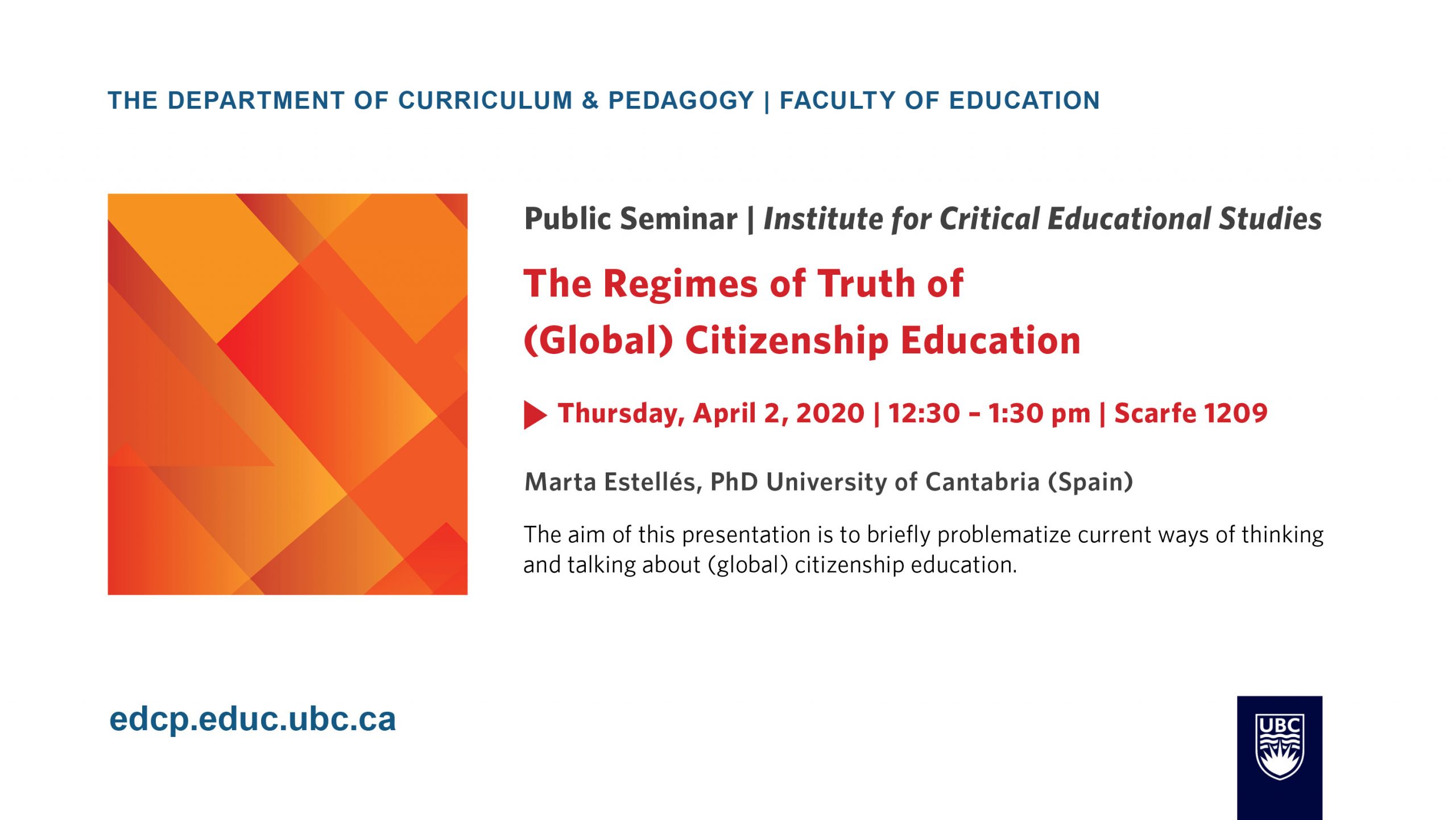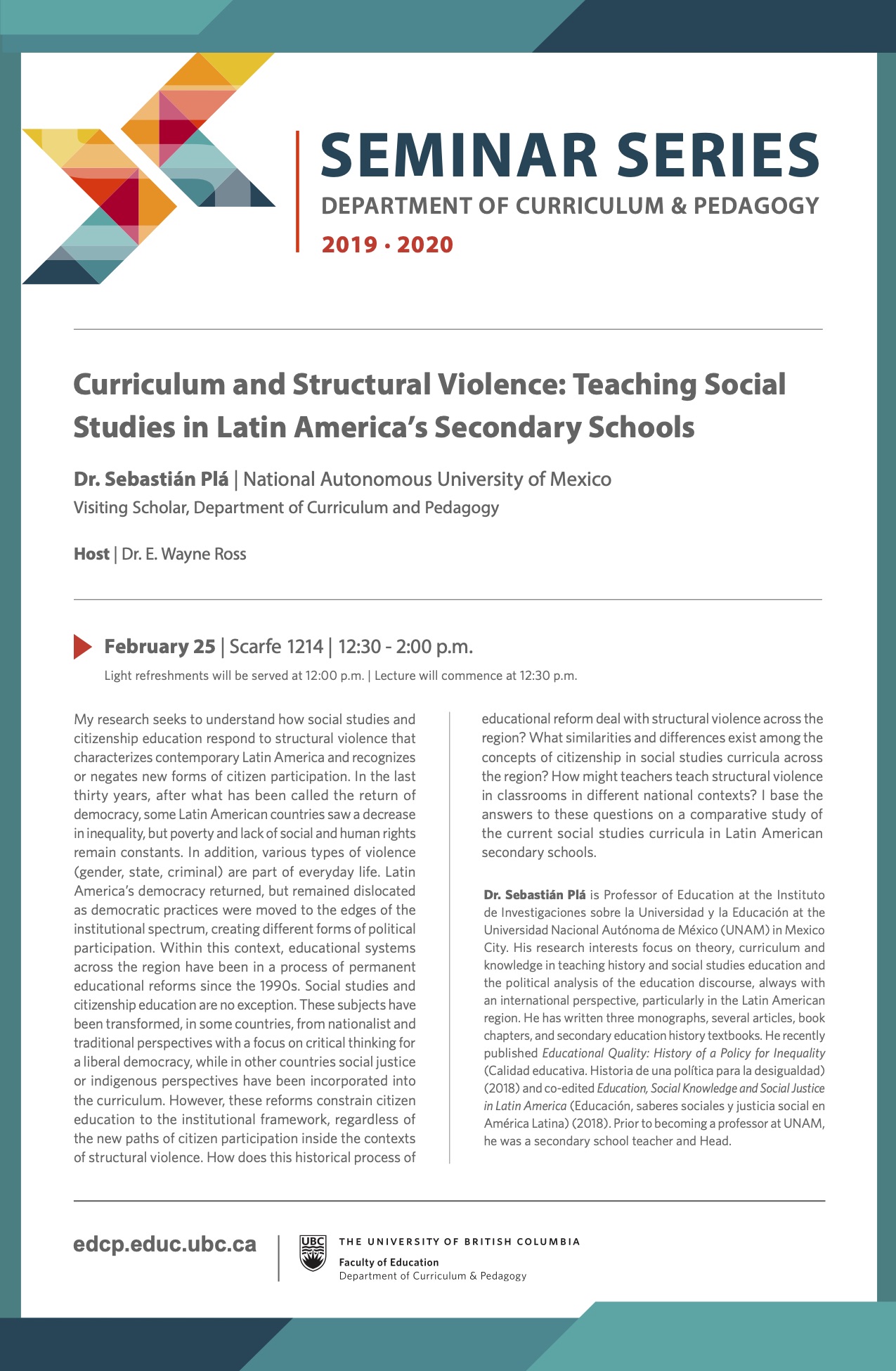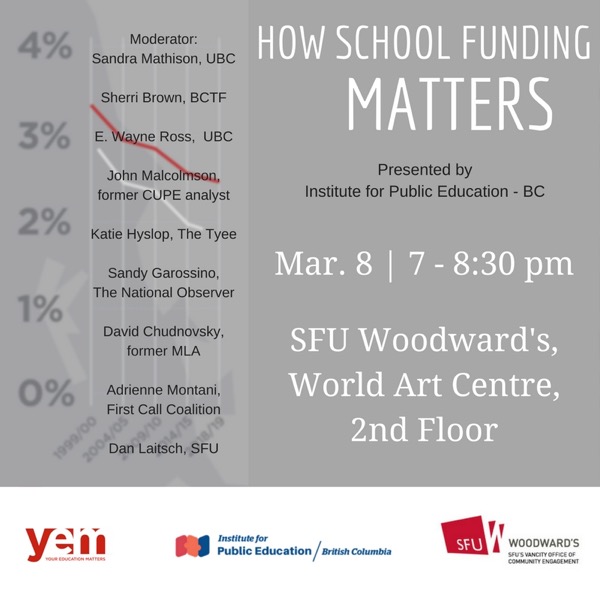Event cancelled based on UBC recommendations regarding COVID-19.

Public Seminar
Institute for Critical Educational Studies
THE REGIMES OF TRUTH OF (GLOBAL) CITIZENSHIP EDUCATION
Marta Estellés, PhD
University of Cantabria (Spain)
Thursday, April 2, 2020
12:30 – 1:30 pm
University of British Columbia, Vancouver — Scarfe 1209
Abstract
The aim of this presentation is to briefly problematize current ways of thinking and talking about (global) citizenship education. Citizenship is a process more than it is an attribute, since the concept has incorporated the main characteristics both of the political transformations experienced by the State and of the State’s relations with society. The successive battles for the definition of citizenship have an impact on that institution of socialization that is school. Examining the evolution of curricular prescriptions and orientations is enough to glimpse changes in the languages and frames through which certain relations between the individual, the community, and the State are naturalized.
The results of our research show that the two major cycles of socio-institutional restructuring in Western countries – from the crisis of the nineteenth-century liberal regimes to the present – have imposed different trends in relation to citizenship education in schools. The first cycle reached its culmination with the implementation of Welfare States after the Second World War. It was not a coincidence that the first major defense for democratic citizenship education appeared in this moment, with the reformist impulse that gave rise in 1916 to Social Studies in the US. The recognition of socio-economic rights and the formation of citizenship appeared inextricably linked in the texts of the reform, in an attempt to establish a new “regime of truth” that radically redefined the meaning of education for all, and not only for a privileged minority. This redefinition also implied a criticism of the patriotic and nationalistic purposes of education. This language, however, started to become blurred as neoliberal policies instituted their own frames in the 1980s with Reagan in the US and Thatcher in the UK. Citizenship education began to adopt the rhetoric of accountability with its emphasis on testing, performance levels, skills, etc. and the focus was on promoting responsible and active citizenship that clearly emphasized duties over rights. Thus, it began to be assumed that citizens should be responsible for their own well-being and not the State. Recent discourses on global citizenship education should be seen as heirs of this last redefinition. After all, global citizenship education “aims to empower learners to engage and assume active roles, both locally and globally, to face and resolve global challenges” (UNESCO, 2014, p. 15), assuming that the responsibility of solving those challenges lies with the individuals, not on governments or international organizations.
Marta Estellés, PhD, is Assistant Professor of the Department of Education at the University of Cantabria (Spain). Her research interests include citizenship education, social studies education, curriculum policies and teacher education. She has published several works on the intersectional field of democratic citizenship education and initial teacher education. She is currently working on a research project related to teachers’ political views and behaviors and their attitudes towards including controversial issues in the classroom. She is also part of the Fedicaria collective (http://www.fedicaria.org), which advocates for critical social studies education.

 Follow
Follow


The Fear Created by Precarious Existence in The Neoliberal World Discourages Critical Thinking / La peur créée par l’existence précaire dans le monde néolibéral décourage la pensée critique
E. Wayne Ross, co-editor of Critical Education, was recently interviewed about the impact of neoliberal capitalism on schools, universities, and education in general by Mohsen Abdelmoumen, an Algerian-based journalist.
Over the course of the interview he discussed a wide-range of issues, including: the fundamental conflict between neoliberalism and participatory democracy; the Global Education Reform Movement (GERM) and the possibilities of transforming schools and universities into forces for progressive change and, in particular, academic freedom and free speech on campus, schools as illusion factories, curriculum as propaganda; what it means to be a dangerous citizen; and the role of intellectuals/teachers as activists.
The interview has been published in English and French, links below.
The Fear Created by Precarious Existence in The Neoliberal World Discourages Critical Thinking – American Herald Tribune
La peur créée par l’existence précaire dans le monde néolibéral décourage la pensée critique – Algérie Résistance II
La peur créée par l’existence précaire dans le monde néolibéral décourage la pensée critique – Palestine Solidarité
Leave a comment
Posted in Publishing, Working condition
Tagged Academic freedom, Activism, citizenship education, Commentary, Corporate University, Critical Education, dangerous citizenship, Free speech, Government, higher education, interviews, neoliberalism, publishing, Research, Student Movement